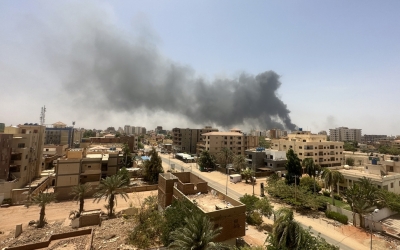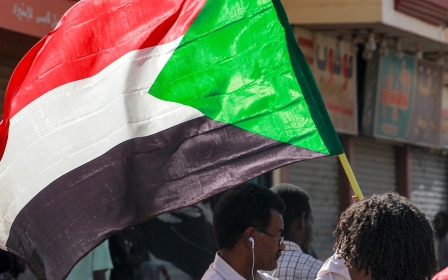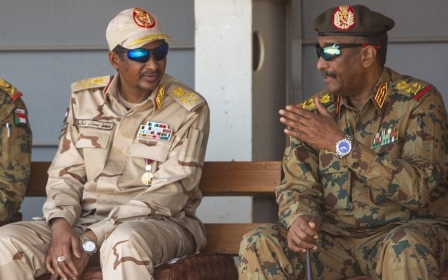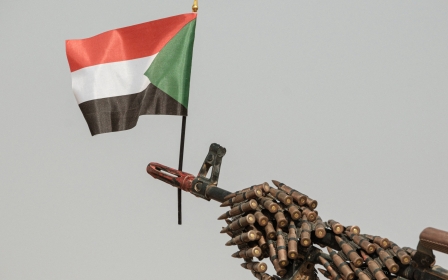Sudan: Panic grips the country as clashes escalate between army and paramilitaries
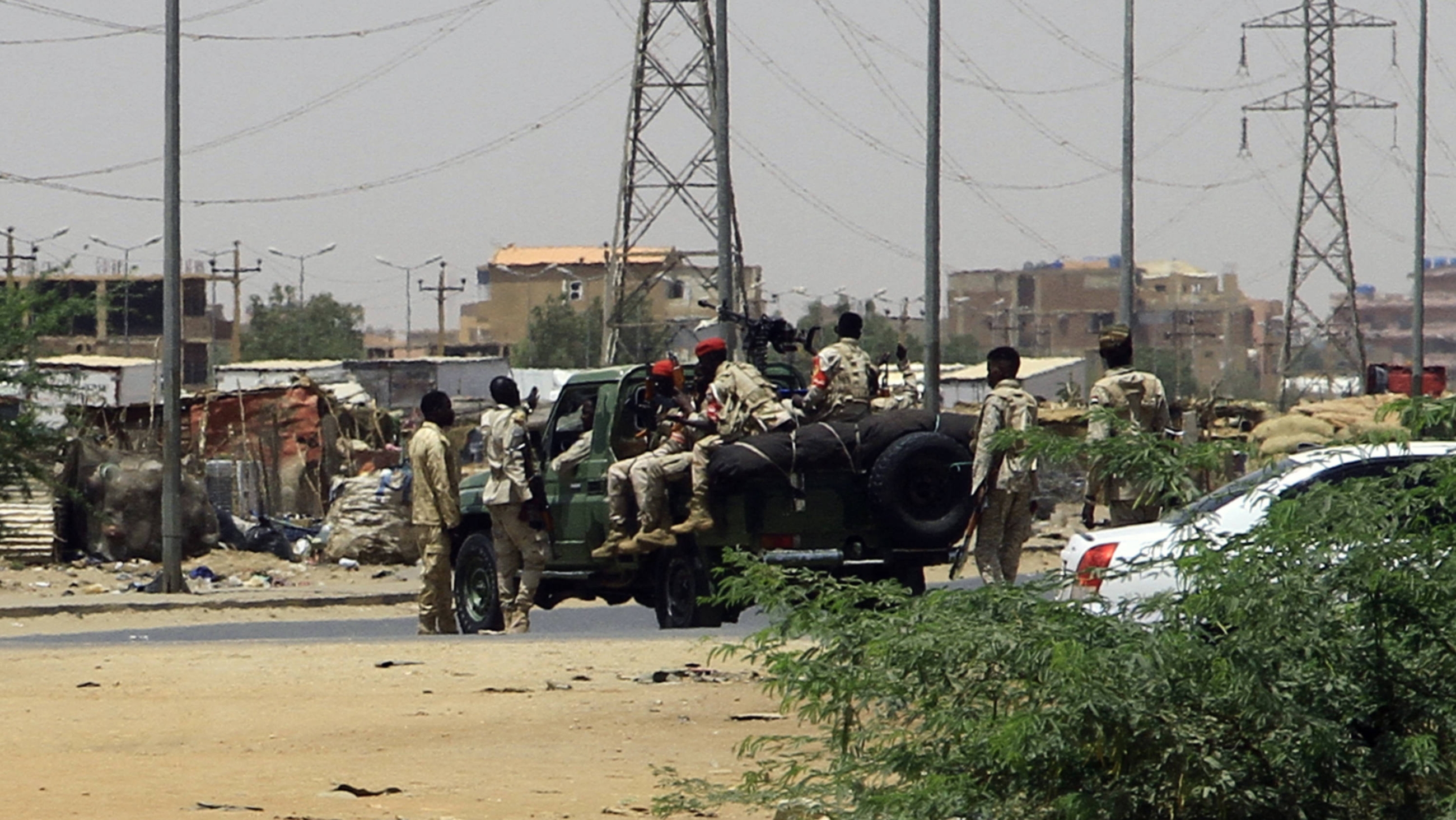
Travellers at Khartoum International Airport were taken by surprise early on Saturday when a Sudanese paramilitary force attempted to seize control of the facility, forcing passengers to take cover on the floor and seek safety behind their luggage.
"I was sitting inside the departure terminal when vehicles belonging to the Rapid Support Forces (RSF) stormed the airport's grounds and clashes broke out between them and soldiers based at the airport," Ahmed Abdul-Rahman, a Sudanese travellor who was supposed to be flying to Saudi Arabia, told Middle East Eye.
"The fighting was very intense, first with light weapons then artillery was used. I saw some civilians randomly shot, then all of the civilians rushed to escape."
Clashes erupted across several parts of the country early on Saturday when the Rapid Support Forces (RSF) attempted to wrest contol of several strategic facilities, including the presidential palace, from the military.
Created in 2013, the RSF emerged from the Janjaweed militia that then-president Omar al-Bashir unleashed against non-Arab ethnic minorities in the western Darfur region a decade earlier, drawing accusations of war crimes.
"We woke up this morning to the sounds of bullets and bombs around us. We were terrified," Salma Abdo, a resident of Khartoum's el-Daim neighbourhood, told MEE.
"We are afraid of going out and we've been sheltering indoors since. We don’t know what’s going on outside."
The two sides have blame each other for the fighting, while international powers, including the US, Russia, Egypt, Saudi Arabia and the United Arab Emirates have called for an end to hostilities.
'Upper hand'
Shortly after the fighting erupted, the RSF, which is estimated to have around 100,000 fighters, claimed it had seized controlled of several facilities including the airport, presidential palace, the army chief's residence in Khartoum, as well as air force bases in Merowe and el-Obeid.
"We will not stop fighting until we capture all the army bases and the honourable members of the armed forces join us," RSF chief Mohamed Hamdan Daglo, who is better known as Hemeti, told Al Jazeera.
However, army chief General Abdel Fattah al-Burhan denied the RSF's claims, later telling Al Jazeera that the army was in full control of the presidential palace, military headquarters and the airport.
MEE could not independently verify the RSF’s claims.
The army later said it had carried out air strikes and "destroyed" two RSF bases in eastern and northern Khartoum.
'We are afraid of going out and we’ve been sheltering indoors since'
- Salma Abdo, Khartoum resident
A military expert, who spoke with MEE on condition of anonymity for security reasons, said while the RSF appeared to have the upper hand on the ground, the military still had the edge with the air force.
"The RSF is advancing on the ground because of the number of fighters they have, in addition to possessing vehicles armed with cannons. They have the upper hand on the streets inside Khartoum and they can wage a quick and effective attack," the expert said.
"However, the army's advantage is the air force and I think this is why the RSF tactic started with controlling the civil and military airports, in order to neutralise the air force.
"It's also difficult for a regular army, like the national army, to fight in the streets, including inside neighbourhoods, [as] the RSF [does]. This gives the paramilitary force an advantage over the army."
According to a statement issued by the Sudan Doctors Committee - a part of the country's pro-democracy movement - at least three civilians were killed in clashes on Saturday.
Nisrin Elamin, an Assistant Professor of Anthropology and African Studies at the University of Toronto, told MEE, that she was sheltering in place after clashes broke out near where she lives in Bahri, an area of the capital.
"We can hear heavy gunfire between Sudanese army and the RSF. The electricity is out and the internet will likely get shut down soon too."
End of nominal alliance
Burhan and Hemeti had maintained an uneasy alliance since the October 2021 coup led by Burhan, which saw the military replace Sudan's transitional civilian-led government.
But tensions between the military and the RSF, which operates under a specialised law and has its own chain of command, have been brewing for weeks over discussions concerning the integration of the paramilitaries into the army and what authorities should oversee the process.
The disagreement has delayed the signing of an internationally backed agreement with political parties regarding a transition to democracy.
Western governments have warned of the dangers of all-out fighting between the rival security forces, saying it could plunge the country into widespread conflict.
The head of the UN mission in Sudan, Volker Perthes, called for an "immediate" ceasefire, and the UN's Emergency Relief Coordinator Martin Griffiths said "more violence will only make things worse" for the one-third of Sudanese who need humanitarian aid.
The latest deaths, during the Muslim holy fasting month of Ramadan, come after more than 120 civilians have already been killed in a crackdown on regular pro-democracy demonstrations since the coup.
The military's civilian interlocutors called on both sides "to immediately cease hostilities and spare the country slipping into the abyss of total collapse."
A ceasefire call also came from former prime minister Abdalla Hamdok who was ousted in the coup, later reinstated, and then resigned.
"This is a power struggle for political control and it is the people of Sudan who have long been demanding a full transition to civilian rule, who are suffering the consequences of this power struggle," Elamin said.
Middle East Eye propose une couverture et une analyse indépendantes et incomparables du Moyen-Orient, de l’Afrique du Nord et d’autres régions du monde. Pour en savoir plus sur la reprise de ce contenu et les frais qui s’appliquent, veuillez remplir ce formulaire [en anglais]. Pour en savoir plus sur MEE, cliquez ici [en anglais].


